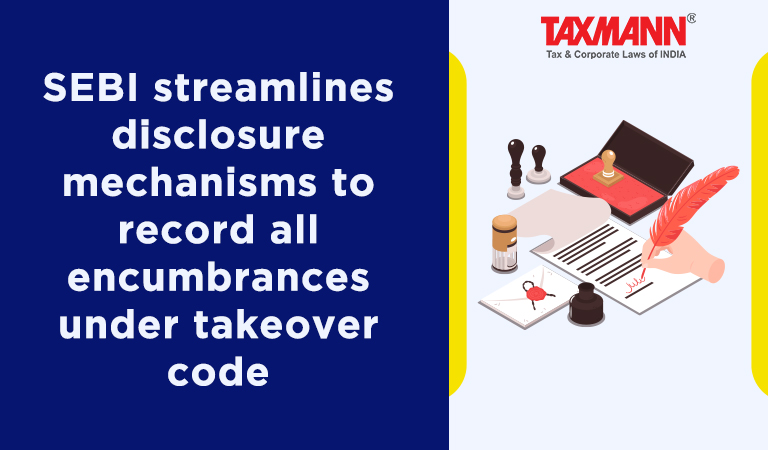SEBI streamlines disclosure mechanisms to record all encumbrances under takeover code
- Blog|News|Company Law|
- 2 Min Read
- By Taxmann
- |
- Last Updated on 9 March, 2022

Circular No. SEBI/HO/CFD/DCR-3/P/CIR/2022/27, Dated, 07-03-2022
In order to streamline the capture and dissemination of information related to “encumbrances” and bring in more transparency, SEBI, in consultation with stock exchanges and depositories, has decided that all types of encumbrances as defined u/s 28 (3) of Takeover Regulations shall necessarily be recorded in the depository system. The depositories shall capture details of the ultimate lender along with the name of the trustee acting on behalf of such ultimate lender such as banks, NBFCs, etc. SEBI decided that the depositories shall now capture the reasons for encumbrances in the depository system.
SEBI has directed the depositories to devise an appropriate mechanism to record all types of outstanding encumbrances in the depository system by June 30, 2022.
For the purpose of dissemination of this information, the SEBI directed the depositories to provide information to the stock exchanges for the transactions recorded in the depository system. SEBI also directed the stock exchanges to consolidate the information received from both the depositories and disseminate the same on their website as per the formats specified by SEBI. The stock exchanges were also directed to devise an appropriate mechanism for dissemination of disclosures under System Driven Disclosures (‘SDD’) in a simple readable pdf format.
SEBI further clarified that Reconciliation of data shall be conducted by listed companies, stock exchanges, and depositories at least once in a quarter or immediately whenever any discrepancy is noticed. The provisions of the circular would come into effect from July 01, 2022.
Click Here To Read The Full Notification
Disclaimer: The content/information published on the website is only for general information of the user and shall not be construed as legal advice. While the Taxmann has exercised reasonable efforts to ensure the veracity of information/content published, Taxmann shall be under no liability in any manner whatsoever for incorrect information, if any.

Taxmann Publications has a dedicated in-house Research & Editorial Team. This team consists of a team of Chartered Accountants, Company Secretaries, and Lawyers. This team works under the guidance and supervision of editor-in-chief Mr Rakesh Bhargava.
The Research and Editorial Team is responsible for developing reliable and accurate content for the readers. The team follows the six-sigma approach to achieve the benchmark of zero error in its publications and research platforms. The team ensures that the following publication guidelines are thoroughly followed while developing the content:
- The statutory material is obtained only from the authorized and reliable sources
- All the latest developments in the judicial and legislative fields are covered
- Prepare the analytical write-ups on current, controversial, and important issues to help the readers to understand the concept and its implications
- Every content published by Taxmann is complete, accurate and lucid
- All evidence-based statements are supported with proper reference to Section, Circular No., Notification No. or citations
- The golden rules of grammar, style and consistency are thoroughly followed
- Font and size that’s easy to read and remain consistent across all imprint and digital publications are applied



 CA | CS | CMA
CA | CS | CMA
